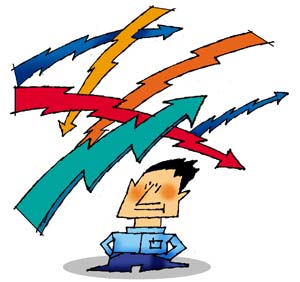
 ou must have heard this question quite often: How was the market today?
ou must have heard this question quite often: How was the market today?
The person asking this question could be referring to the debt market (comprising fixed income instruments like fixed deposits and bonds), the forex market (where currencies are bought and sold), or the stock market (where shares are bought and sold).
What we are specifically referring to in this article is the stock market.
When someone talks about the market, they are not referring to an actual physical place where people meet to buy and sell. The term stock market is a generic term to denote trading (buying and selling of shares).
What makes up the market?The stock exchanges.
The stock market will have either one or a number of stock exchanges.
In India, the most famous are the Bombay Stock Exchange and the National Stock Exchange.
The NSE is the country's largest exchange, which means it sees the most amount of shares bought or sold in a day. The BSE stands second but is the oldest; it was established way back in 1875.
Then there are regional exchanges like the Ahmedabad Stock Exchange, Calcutta Stock Exchange and the Cochin Stock Exchange.
The two most prominent ones are the BSE and NSE. Together, they account for most of the stock trades in the country. Which means that if they catch a cold, exchanges all over the country will sneeze.
What makes up a stock exchange?Its members, the stock brokers
People like you and me just cannot go to a stock exchange and buy and sell shares. If we want to do so, we have to get in touch with someone who is a member of the stock exchange. Which means we need to talk to a stockbroker.
Stockbrokers buy and sell shares for themselves to make a profit. They also buy and sell shares on behalf of people like you and me and take a commission for doing so (more on this on another day).
Every stockbroker has to be registered with the Securities and Exchange Board of India, which is the stock market regulator. SEBI's main function is to make sure those who invest in the stock market follow the rules and no scams take place. It is supposed to act as a watchdog on behalf of the investors.
Readers from Mumbai may have seen the imposing stock exchange building called Jeejeebhoy Towers. That's the home of the BSE.
But you would be disappointed if you think you can step inside the building and watch the market excitement firsthand as brokers frenziedly trade stocks. That's because all stock markets in India are now electronic.
Brokers have BSE computer terminals in their offices, from which they trade. They also have BSE terminals in other cities and don't have to be physically present in Mumbai to trade on the BSE. This means that even if you stay outside Mumbai, you can contact a BSE broker and buy or sell stocks on the BSE.
Years ago, the BSE was a place where brokers physically bought and sold stocks and shares through a system known as 'open outcry'. As a result, the market then resembled a fish or vegetable market.
If you watch CNBC, you'll find that the New York Stock Exchange still follows that system, with traders rushing around on the trading floor, scribbling trades on little slips of paper.
Actually, the improvements in the BSE came about when the government promoted the NSE. The NSE was an electronic exchange from the beginning and it started competing with the BSE, which in turn forced the BSE to tone up its act.
How the stock exchange protects youStock exchanges make sure your transactions are safe and secure and brokers follow the rules while trading.
The function of stock exchanges is to ensure brokers have enough capital (money) to enable them to conduct their business satisfactorily. Of course, that hasn't been able to prevent scams, but that's another story.
You also have a better chance of getting a good price.
Let's suppose you have a stock which very few people want to buy. But when your sell order is placed on the BSE, it is viewed by thousands of brokers on their computer screens and, if the right price, someone may decide to buy. Sell or buy orders in an exchange reach a large audience and that can work to your benefit.
When you buy or sell stocks through a stock exchange, your trades are guaranteed.
Suppose, for example, your broker has sold stocks on your behalf to another broker and the second broker's business fails. In this case, your trade is protected and you will get your money back because all trades on a stock exchange are guaranteed by the Clearing Corporation, which settles transactions between brokers.
Internationally, some of the most well-known stock exchanges are the New York Stock Exchange, the NASDAQ or the US stock exchange where the shares of mostly technology companies are listed, and the London Stock Exchange.
DON'T MISS!
Sensex? What's that?
Make money with shares
What's in a share? Money!
How the stock exchange protects your money
Growth stocks can make you rich!
Greed = Loss at the stock market
Illustration: Dominic Xavier





